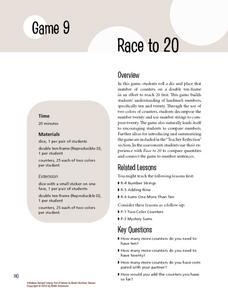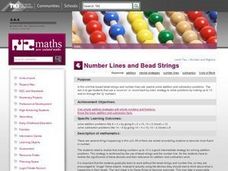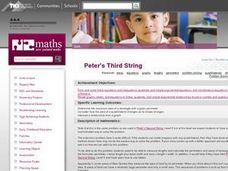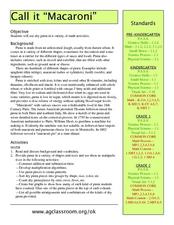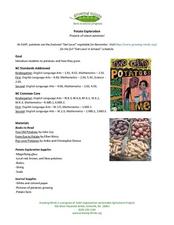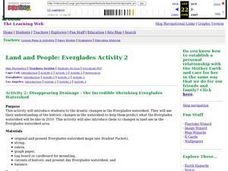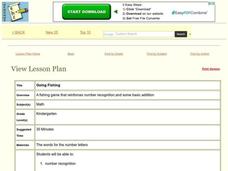Math Solutions
Race to 20
And they're off! Working in pairs, young mathematicians roll dice to see who can fill in their double ten-frames first. When students finally fill in their arrays, they create addition number sentences that represent their rolls, helping...
Curated OER
Number Lines and Bead Strings
Students solve addition and subtraction problems using strings of beads and number lines. They mentally perform addition and subtraction problems, and write and solve story problems involving whole numbers.
Curated OER
Peter's Third String
Explore the solution to a word problem involving area and perimeter. Learners read and discuss how to approach the problem. In small groups, they determine the maximum area of a rectangle with a given perimeter using a piece of string....
Curated OER
Call it "Macaroni"
Who knew there were so many fun educational opportunities featuring pasta? Scholars read a brief informational text about the history of pasta (note that "macaroni" is spelled two different ways, so address this if kids are reading...
August House
Anansi Goes To Lunch - First Grade
Greed is the theme of this collection of multidisciplinary activities. As a class, read The West African folktale, Anansi Goes to Lunch by Bobby Norfolk, and take part in a grand discussion about it's plot and theme. Reinforce the...
Curated OER
Vector Lab
Here is a math lab that helps young mathematicians understand the real-life meaning for vector addition. By building a model using spring scales and washers as weight, and then calculating the vector addition using two different methods,...
Curated OER
Muscular and Skeletal Systems
How do muscles move bones? Find out using a built-in-class model. Pupils construct a hand model with paper and string, then follow a series of directions to explore the movement process. Discover additional information about the muscular...
Curated OER
Going Fishing
In this addition facts lesson, students recognize the numbers and are able to add simple problems by participating in a fishing game. Students use a fishing pole with a washer on the end to fish for magnetic fish made out of foam....
Curated OER
Waterskiing in Circles
High schoolers discuss and give examples of Newton's three laws. They then answer questions in reference to Newton's three laws. One example of the questions that students answer is: A water-skier typically uses a 75 foot tow rope. The...
Curated OER
Teaching Arithmetic and Math Concepts to Headstarters
Learners discover early number concepts for numbers 1 through 5. In this number concepts instructional activity, students work in stations doing hands-on activities such as sorting colored blocks, stringing beads, and counting sticks....
Growing Minds
Potato Exploration: Projects All About Potatoes!
How many potatoes tall are you? Unearth this rich resource! A reading of John Coy’s Two Old Potatoes begins a cross-curricular exploration of potatoes. Class members read, write, weigh, measure, and experiment with potatoes. Additional...
Primary National Strategy
Ordering and Counting
Are you in need of a 5-day unit intended to teach little learners how to count to 20? This is a well-structured complete set of lessons which employ a variety of methods to instruct learners about various ways to count from 1 to 20. They...
Curated OER
Activity 2: Disappearing Drainage - the Incredible Shrinking Everglades Watershed
Students examine drastic changes in Florida Everglades watershed, compare and contrast two watershed maps, discuss effects of addition of agriculture, loss of wetlands, and introduction of Water Conservation Areas, and predict condition...
Curated OER
Utah History & Geography
Fourth graders practice large digit addition. Students become familiar with column addition. Students develop knowledge of counties and county seats.
Curated OER
Bowling Math
Young scholars calculate bowling scores by using math skills. In this bowling instructional activity, students take a trip to a bowling alley and use a worksheet to figure out bowling scores. Young scholars use prior math skills such as...
Curated OER
Going Fishing
Students constructaA fishing game that reinforces number recognition,and some basic addition.They use foam sheets to make fish cutouts of different colors and with a addition problem on the bigger one's and the answers on the smaller one.
Curated OER
Johnny Appleseed Walkabout
Second graders calculate mileage for a journey. In this place value and measurement lesson, 2nd graders read Johnny Appleseed, work in groups to locate his birthplace on a map, locate the other states he stopped in, and measure the...
Curated OER
Fact Families
Students create "fact families" using digital pictures of their classmates and knowledge of basic math concepts (subtraction and addition) in this technology-based math lesson intended for use in the early-elementary classroom. A...
Curated OER
Balloon Rockets
Students, after reviewing and analyzing Newton's third law of motion, make balloon rockets and experiment with a variety of models. After the experiment, they chart the results and form conclusions. In addition, they compare/contrast...
Curated OER
Perimeter Play
Fifth graders identify that the perimeter of a shape is the sum of its sides.
Students cut some string or rope to make the sides of a rectangle. Students write the measurement of the length of the rectangle and the measurement of the...
Curated OER
Jumpy Dolls
Students are challenged to design and construct a jointed figure that moves in a motion something like jumping jacks when a string is pulled.
Curated OER
Counting and Math Concepts
Students practice counting to the number three. In this number sense lesson, students practice counting to the number three by using various objects. Students arrange and count the objects.
Curated OER
Utah History & Geography
Fourth graders calculate and determine the distances between counties in Utah. Using a map of Utah, they determine the distance between three county seats, the total distance round trip, and label a map with the distances.
Curated OER
Styrofoam Earth
Students examine how there are three layers inside the Earth. They design their own model of the layers of the Earth with a Styrofoam ball. They illustrate the layers inside the Earth with crayons.
